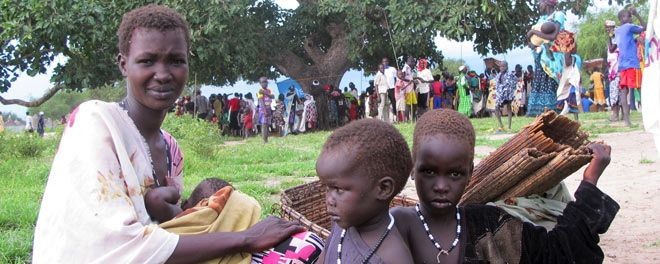Cuaca, a 22-year old woman from Bor, was caring for a newborn child and two toddlers when gunmen forced her to flee for her life.
“I fled because I am afraid of guns and afraid to be shot and killed,” says Cuaca, describing events at the outbreak of South Sudan’s civil war in December 2013.
She traveled on foot for ten days together with her three daughters – 4-year-old Mawiek, 2-year-old Nyawech and baby Nyadieng – with few belongings other than the clothes on their backs.
Cuaca says she carried one of her children in a basket balanced carefully on her head. She slept outdoors with others also fleeing for their lives, until reaching Pathai, a village considered safe from attack.
Somehow she and all of her children survived.
Cuaca herself is an orphan whose parents died when she young. She was married at age 14. She was separated from her husband. She was left alone with her children.
She says she has a brother who used to help her. She wants to see him again, but they have been separated by war.
Her new home Pathai has no roads, markets, hospitals or schools, and the UN Children’s Agency (UNICEF) says that the village “is in the grip of a hunger crisis.”
Local villagers tried to help newcomers like Cuaca and her girls, but they soon ran out of food.
“We are eating leaves off the trees,” Cuaca says, gesturing to her youngest child, who is chewing on grass. “She is hungry,” she explains.
Hope
Cuaca says that she hopes that the conflict will end soon so that her daughters can finish school and have more opportunities than she did.
According to the UN, however, 88 schools in South Sudan have been closed because they have been occupied by either soldiers or displaced people. Others are closed because unpaid teachers have been recruited into the army or militias.
The UN says the terrible violence has forced nearly 1.9 million people from their homes. The majority of them are now living in remote places like Pathai – in the bush, on river islands or in far-flung villages.
“They have survived against the odds, desperately waiting for peace and a return to normality,” says UNICEF.
Cuaca says she does not want her daughters to be married when they are still children. She says she hopes they will care for her when she is older.
“If they could get an education, they could help me in the future. They can be married when they are 18, not 14, like me.”
This article is adapted largely from a story published on the UNICEF website.




